Unit 4 Revision(Topic_My day)(共21张PPT)
文档属性
| 名称 | Unit 4 Revision(Topic_My day)(共21张PPT) |
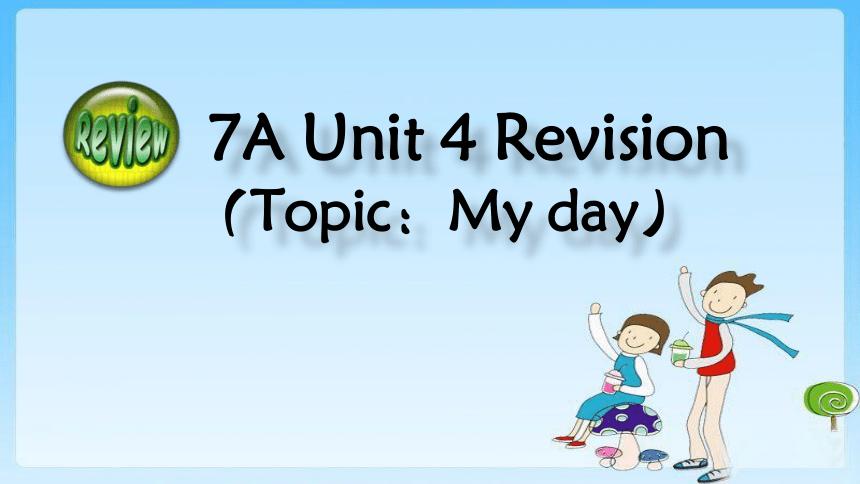
|
|
| 格式 | ppt | ||
| 文件大小 | 4.6MB | ||
| 资源类型 | 教案 | ||
| 版本资源 | 牛津译林版 | ||
| 科目 | 英语 | ||
| 更新时间 | 2022-05-17 00:00:00 | ||
图片预览

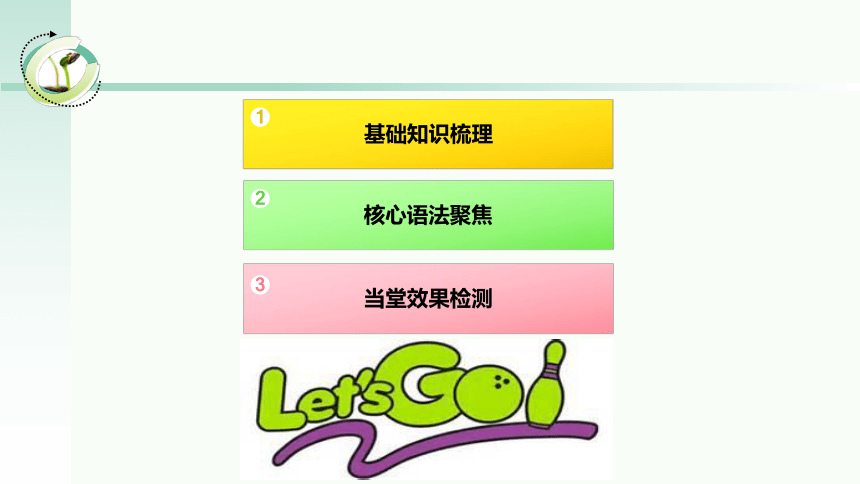
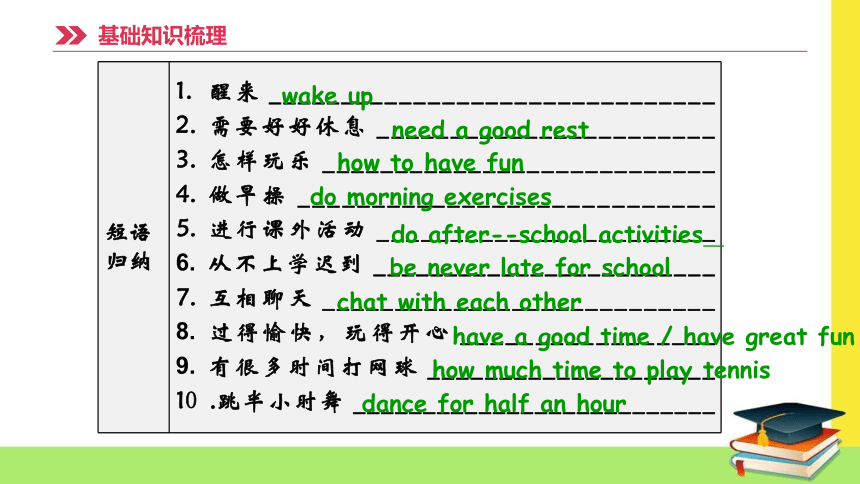
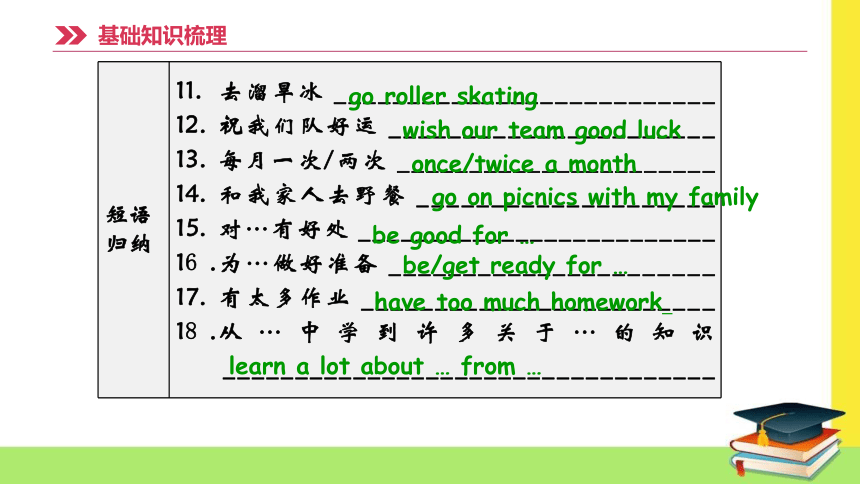
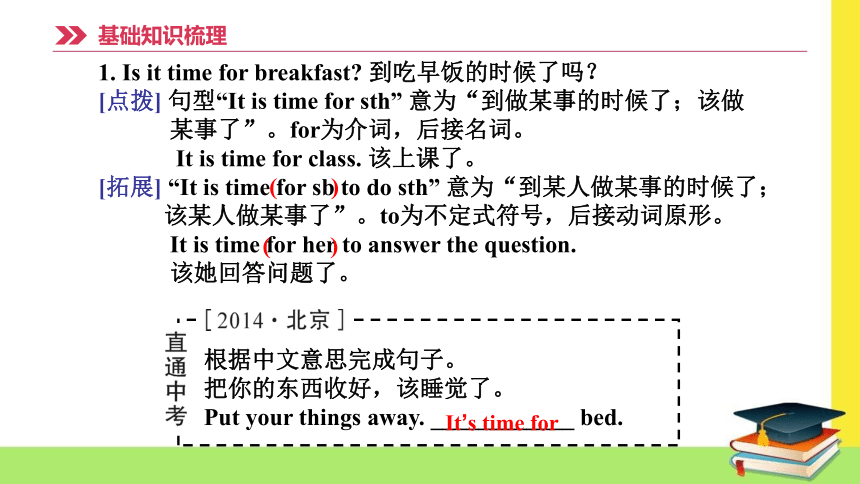
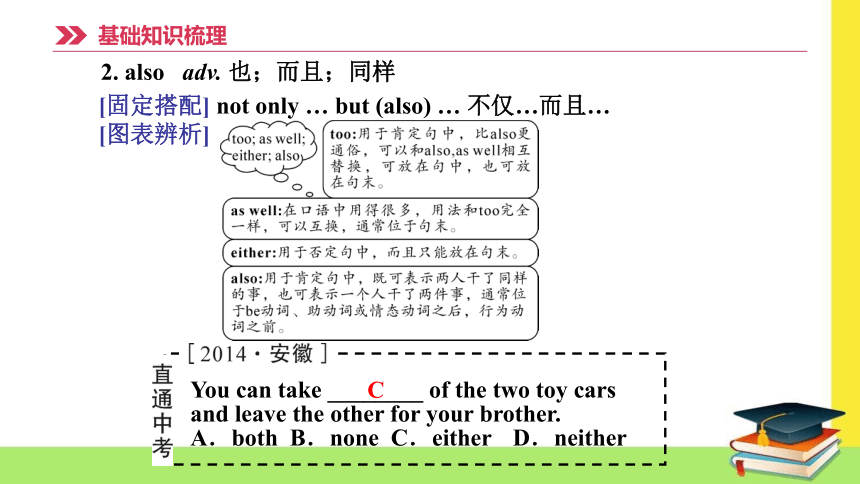
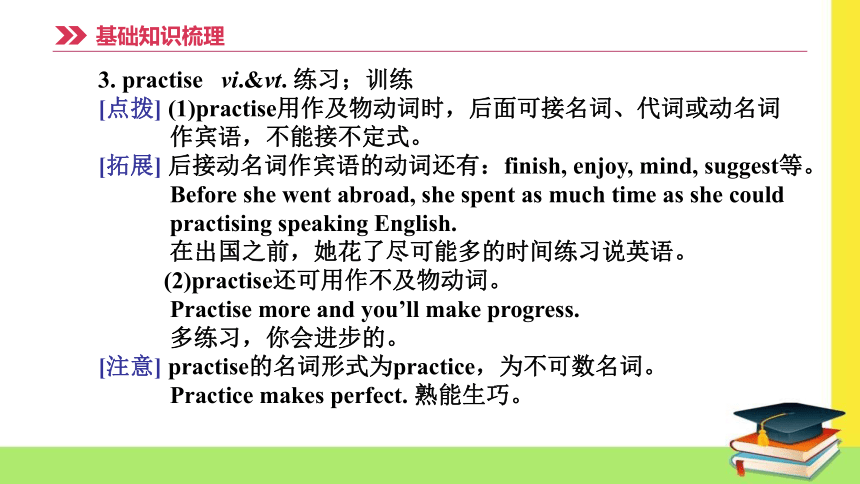
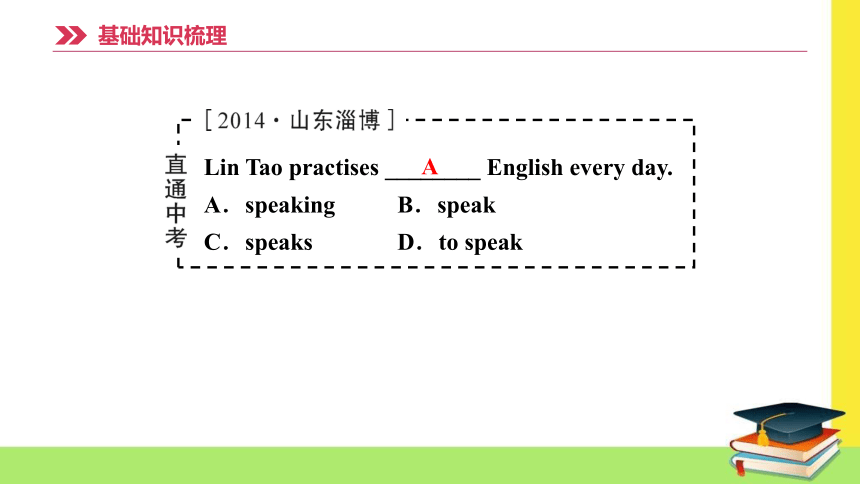
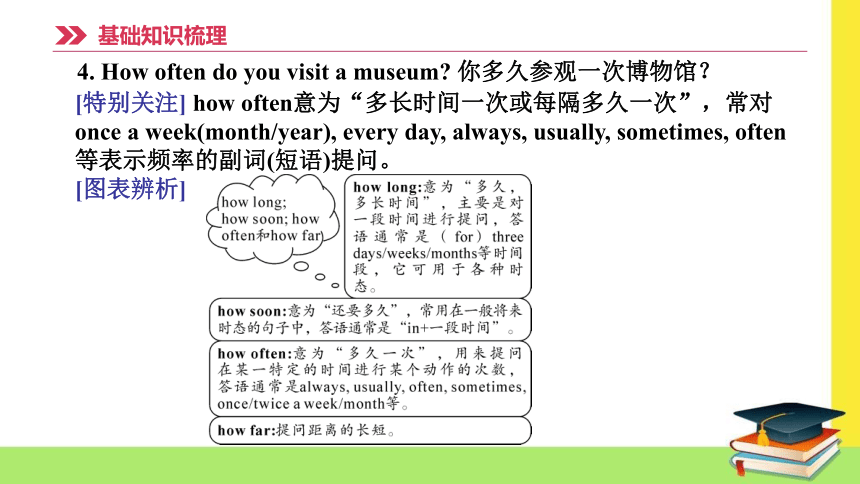
文档简介
(共21张PPT)
1
2
3
基础知识梳理
短语
归纳 醒来 _______________________________
需要好好休息 _______________________
怎样玩乐 ___________________________
做早操 ____________________________
进行课外活动 _______________________
从不上学迟到 ________________________
互相聊天 ___________________________
过得愉快,玩得开心 _________________
有很多时间打网球 ____________________
跳半小时舞 __________________________
do after- school activities
chat with each other
have a good time / have great fun
wake up
need a good rest
how to have fun
do morning exercises
how much time to play tennis
dance for half an hour
be never late for school
短语
归纳 去溜旱冰 __________________________
祝我们队好运 ______________________
每月一次/两次 ______________________
和我家人去野餐 ____________________
对…有好处 _________________________
为…做好准备 ______________________
有太多作业 ________________________
从…中学到许多关于…的知识
__________________________________
once/twice a month
go on picnics with my family
be good for …
be/get ready for …
learn a lot about … from …
go roller skating
have too much homework
基础知识梳理
wish our team good luck
1. Is it time for breakfast 到吃早饭的时候了吗?
[点拨] 句型“It is time for sth” 意为“到做某事的时候了;该做
某事了”。for为介词,后接名词。
It is time for class. 该上课了。
[拓展] “It is time for sb to do sth” 意为“到某人做某事的时候了;
该某人做某事了”。to为不定式符号,后接动词原形。
It is time for her to answer the question.
该她回答问题了。
基础知识梳理
( )
( )
根据中文意思完成句子。
把你的东西收好,该睡觉了。
Put your things away. ____________ bed.
It’s time for
2. also adv. 也;而且;同样
[固定搭配] not only … but (also) … 不仅…而且…
[图表辨析]
基础知识梳理
You can take ________ of the two toy cars and leave the other for your brother.
A.both B.none C.either D.neither
C
3. practise vi.&vt. 练习;训练
[点拨] (1)practise用作及物动词时,后面可接名词、代词或动名词
作宾语,不能接不定式。
[拓展] 后接动名词作宾语的动词还有:finish, enjoy, mind, suggest等。
Before she went abroad, she spent as much time as she could
practising speaking English.
在出国之前,她花了尽可能多的时间练习说英语。
(2)practise还可用作不及物动词。
Practise more and you’ll make progress.
多练习,你会进步的。
[注意] practise的名词形式为practice,为不可数名词。
Practice makes perfect. 熟能生巧。
基础知识梳理
Lin Tao practises ________ English every day.
A.speaking B.speak
C.speaks D.to speak
A
基础知识梳理
基础知识梳理
4. How often do you visit a museum 你多久参观一次博物馆?
[特别关注] how often意为“多长时间一次或每隔多久一次”,常对once a week(month/year), every day, always, usually, sometimes, often等表示频率的副词(短语)提问。
[图表辨析]
—________ is the World Cup held
—Every 4 years.
A.How soon B.How often
C.When D.Where
B
基础知识梳理
5. too much 太多
[图表辨析]
基础知识梳理
根据汉语意思用英语完成句子。
玩电脑游戏太多对我们的眼睛不好。
______________________________________________________________________________________________________
It’s bad for our eyes to play computer games too much. / Playing computer games too much is bad for our eyes.
6. luck n. 运气
[拓展] luck的形容词形式为lucky, 意为“好运的”;
它的副词形式为luckily, 意为“幸运地”。
He is lucky enough to pass the exam.
他很幸运地通过了这次考试。
Luckily, the police came right away.
幸运的是, 警察马上就来了。
注意:lucky 加上否定前缀un , 即unlucky, 意为“不幸的”;
它的副词形式为unluckily, 意为“不幸地”。
基础知识梳理
基础知识梳理
7. hope和wish
hope 和 wish都有“希望”之意,但用法不同。
(1)hope既可用作动词,又可用作名词,意为“希望, 盼望”,
通常指可以实现的愿望。其常用结构:
①hope for sth ②hope to do sth ③主语+hope+(that)从句
I hope for an early answer to my letter. 我希望早点得到回信。
I hope to go to college. 我希望上大学。
I hope you’ll be better soon. 我希望你能很快好起来。
[巧辨异同]
基础知识梳理
(2)wish既可用作动词,又可用作名词,意为“希望, 愿望, 心愿”,
通常指不能实现或很难实现的愿望。其常用结构:
①wish for sth ②wish to do sth
③wish sb to do sth ④wish sb sth
⑤主语+wish+(that)从句 (wish后的宾语从句多用过去时态,表示
虚拟语气)
Do you wish me to leave now 你希望我现在就走吗?
I wish you a very happy life. 祝你一生幸福。
I wish I were 30 years younger. 但愿我能年轻三十岁。
用所给词的适当形式填空。
My parents wish me ________ (be) a teacher when I grow up.
to be
基础知识梳理
8. They help us get ready for the day. 它们有助于我们为一天做好准备。
[点拨] (1)help sb (to) do sth 意为“帮助某人做某事”,
相当于help sb with sth。
Andy often helps his mother with/do housework.
安迪经常帮他妈妈做家务。
(2)get ready for sth 意为“为……做好准备”。=get ready to do
但介词for后面要接代词、名词或动名词。
Most of the students are busy getting ready for the coming sports
meeting. 大部分学生正忙于为即将到来的运动会做好准备。
9. I can learn a lot about the world. 我可以更多地了解这个世界。
[特别关注] learn为动词,意为“了解,获悉,学习,学会”等,后面通常接动词不定式to do sth。与learn相关的短语有learn about ...“了解,获悉”,learn from sb“向某人学习”。
learn
根据句子意思,用括号中所给单词的适当形式填空。
Students in some junior schools can _______ (learn) to play tennis or baseball in PE lessons.
基础知识梳理
核心语法聚焦
教材P118-119
How often …
( )3. Mr Green makes Linda ________ English every morning.
A. reads B. to read C. reading D. read
( )4. —Lucy is ill, ________ she can’t go to school.
—I’m sorry to hear that.
A. but B. so C. for D. or
( )5. —________ does it take you to get to school from your home
—About half an hour.
A. How far B. How many C. How much D. How long
一、单项选择
( )1. —Can you ________ my dog for two days
—Yes, of course.
A. look for B. look at C. look after D. look like
( )2. —________ your classmates all nice to you
—Yes, ________.
A. Are; they’re B. Is; we are C. Are; they are D. Is; he is
C
C
当堂效果检测
D
B
D
二、用括号内所给词的适当形式填空
1. I have a friend. ________ (she) name is Lucy.
2. Millie, are you good at ________ (sing)
3. Peter ________ (study) at a middle school near his home.
4. Doing morning exercises ________ (be) good for our health.
5. What about ________ (meet) my old friends
Her
singing
studies
is
meeting
当堂效果检测
三、根据汉语意思完成句子
1. 他上学从来不迟到。
He ________________ school.
2. 从周一到周五,埃米很少看电视。
Amy ____________________________________ Friday.
3. 你能帮我从你的朋友那儿借一辆自行车吗?
Can you _____________________________ your friend
4. 你妹妹放学后喜欢做什么?
____________ your sister ___________ after school
5. 我的一些新朋友来自北京。
Some of my new friends _______________ Beijing.
is never late for
seldom watches TV from Monday to
help me borrow a bike from
What does
like doing
come/are from
当堂效果检测
1
2
3
基础知识梳理
短语
归纳 醒来 _______________________________
需要好好休息 _______________________
怎样玩乐 ___________________________
做早操 ____________________________
进行课外活动 _______________________
从不上学迟到 ________________________
互相聊天 ___________________________
过得愉快,玩得开心 _________________
有很多时间打网球 ____________________
跳半小时舞 __________________________
do after- school activities
chat with each other
have a good time / have great fun
wake up
need a good rest
how to have fun
do morning exercises
how much time to play tennis
dance for half an hour
be never late for school
短语
归纳 去溜旱冰 __________________________
祝我们队好运 ______________________
每月一次/两次 ______________________
和我家人去野餐 ____________________
对…有好处 _________________________
为…做好准备 ______________________
有太多作业 ________________________
从…中学到许多关于…的知识
__________________________________
once/twice a month
go on picnics with my family
be good for …
be/get ready for …
learn a lot about … from …
go roller skating
have too much homework
基础知识梳理
wish our team good luck
1. Is it time for breakfast 到吃早饭的时候了吗?
[点拨] 句型“It is time for sth” 意为“到做某事的时候了;该做
某事了”。for为介词,后接名词。
It is time for class. 该上课了。
[拓展] “It is time for sb to do sth” 意为“到某人做某事的时候了;
该某人做某事了”。to为不定式符号,后接动词原形。
It is time for her to answer the question.
该她回答问题了。
基础知识梳理
( )
( )
根据中文意思完成句子。
把你的东西收好,该睡觉了。
Put your things away. ____________ bed.
It’s time for
2. also adv. 也;而且;同样
[固定搭配] not only … but (also) … 不仅…而且…
[图表辨析]
基础知识梳理
You can take ________ of the two toy cars and leave the other for your brother.
A.both B.none C.either D.neither
C
3. practise vi.&vt. 练习;训练
[点拨] (1)practise用作及物动词时,后面可接名词、代词或动名词
作宾语,不能接不定式。
[拓展] 后接动名词作宾语的动词还有:finish, enjoy, mind, suggest等。
Before she went abroad, she spent as much time as she could
practising speaking English.
在出国之前,她花了尽可能多的时间练习说英语。
(2)practise还可用作不及物动词。
Practise more and you’ll make progress.
多练习,你会进步的。
[注意] practise的名词形式为practice,为不可数名词。
Practice makes perfect. 熟能生巧。
基础知识梳理
Lin Tao practises ________ English every day.
A.speaking B.speak
C.speaks D.to speak
A
基础知识梳理
基础知识梳理
4. How often do you visit a museum 你多久参观一次博物馆?
[特别关注] how often意为“多长时间一次或每隔多久一次”,常对once a week(month/year), every day, always, usually, sometimes, often等表示频率的副词(短语)提问。
[图表辨析]
—________ is the World Cup held
—Every 4 years.
A.How soon B.How often
C.When D.Where
B
基础知识梳理
5. too much 太多
[图表辨析]
基础知识梳理
根据汉语意思用英语完成句子。
玩电脑游戏太多对我们的眼睛不好。
______________________________________________________________________________________________________
It’s bad for our eyes to play computer games too much. / Playing computer games too much is bad for our eyes.
6. luck n. 运气
[拓展] luck的形容词形式为lucky, 意为“好运的”;
它的副词形式为luckily, 意为“幸运地”。
He is lucky enough to pass the exam.
他很幸运地通过了这次考试。
Luckily, the police came right away.
幸运的是, 警察马上就来了。
注意:lucky 加上否定前缀un , 即unlucky, 意为“不幸的”;
它的副词形式为unluckily, 意为“不幸地”。
基础知识梳理
基础知识梳理
7. hope和wish
hope 和 wish都有“希望”之意,但用法不同。
(1)hope既可用作动词,又可用作名词,意为“希望, 盼望”,
通常指可以实现的愿望。其常用结构:
①hope for sth ②hope to do sth ③主语+hope+(that)从句
I hope for an early answer to my letter. 我希望早点得到回信。
I hope to go to college. 我希望上大学。
I hope you’ll be better soon. 我希望你能很快好起来。
[巧辨异同]
基础知识梳理
(2)wish既可用作动词,又可用作名词,意为“希望, 愿望, 心愿”,
通常指不能实现或很难实现的愿望。其常用结构:
①wish for sth ②wish to do sth
③wish sb to do sth ④wish sb sth
⑤主语+wish+(that)从句 (wish后的宾语从句多用过去时态,表示
虚拟语气)
Do you wish me to leave now 你希望我现在就走吗?
I wish you a very happy life. 祝你一生幸福。
I wish I were 30 years younger. 但愿我能年轻三十岁。
用所给词的适当形式填空。
My parents wish me ________ (be) a teacher when I grow up.
to be
基础知识梳理
8. They help us get ready for the day. 它们有助于我们为一天做好准备。
[点拨] (1)help sb (to) do sth 意为“帮助某人做某事”,
相当于help sb with sth。
Andy often helps his mother with/do housework.
安迪经常帮他妈妈做家务。
(2)get ready for sth 意为“为……做好准备”。=get ready to do
但介词for后面要接代词、名词或动名词。
Most of the students are busy getting ready for the coming sports
meeting. 大部分学生正忙于为即将到来的运动会做好准备。
9. I can learn a lot about the world. 我可以更多地了解这个世界。
[特别关注] learn为动词,意为“了解,获悉,学习,学会”等,后面通常接动词不定式to do sth。与learn相关的短语有learn about ...“了解,获悉”,learn from sb“向某人学习”。
learn
根据句子意思,用括号中所给单词的适当形式填空。
Students in some junior schools can _______ (learn) to play tennis or baseball in PE lessons.
基础知识梳理
核心语法聚焦
教材P118-119
How often …
( )3. Mr Green makes Linda ________ English every morning.
A. reads B. to read C. reading D. read
( )4. —Lucy is ill, ________ she can’t go to school.
—I’m sorry to hear that.
A. but B. so C. for D. or
( )5. —________ does it take you to get to school from your home
—About half an hour.
A. How far B. How many C. How much D. How long
一、单项选择
( )1. —Can you ________ my dog for two days
—Yes, of course.
A. look for B. look at C. look after D. look like
( )2. —________ your classmates all nice to you
—Yes, ________.
A. Are; they’re B. Is; we are C. Are; they are D. Is; he is
C
C
当堂效果检测
D
B
D
二、用括号内所给词的适当形式填空
1. I have a friend. ________ (she) name is Lucy.
2. Millie, are you good at ________ (sing)
3. Peter ________ (study) at a middle school near his home.
4. Doing morning exercises ________ (be) good for our health.
5. What about ________ (meet) my old friends
Her
singing
studies
is
meeting
当堂效果检测
三、根据汉语意思完成句子
1. 他上学从来不迟到。
He ________________ school.
2. 从周一到周五,埃米很少看电视。
Amy ____________________________________ Friday.
3. 你能帮我从你的朋友那儿借一辆自行车吗?
Can you _____________________________ your friend
4. 你妹妹放学后喜欢做什么?
____________ your sister ___________ after school
5. 我的一些新朋友来自北京。
Some of my new friends _______________ Beijing.
is never late for
seldom watches TV from Monday to
help me borrow a bike from
What does
like doing
come/are from
当堂效果检测
